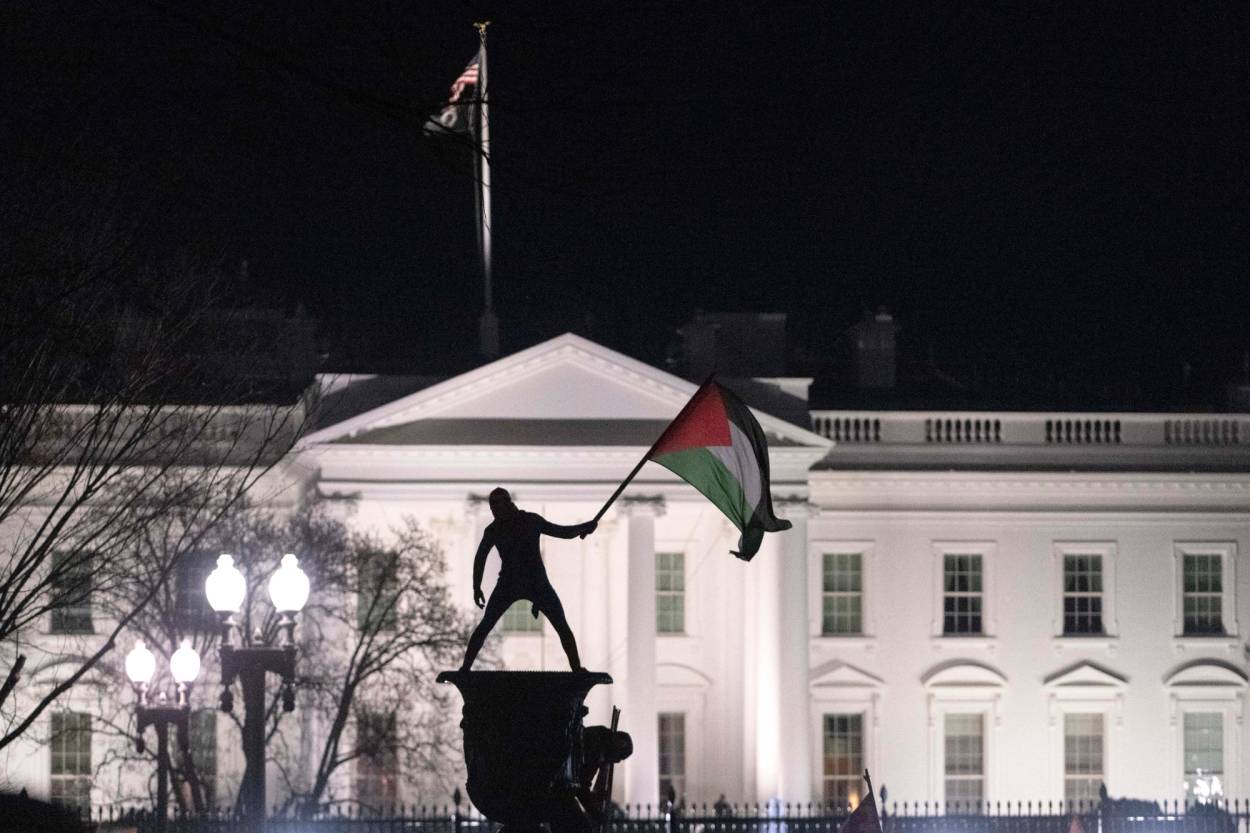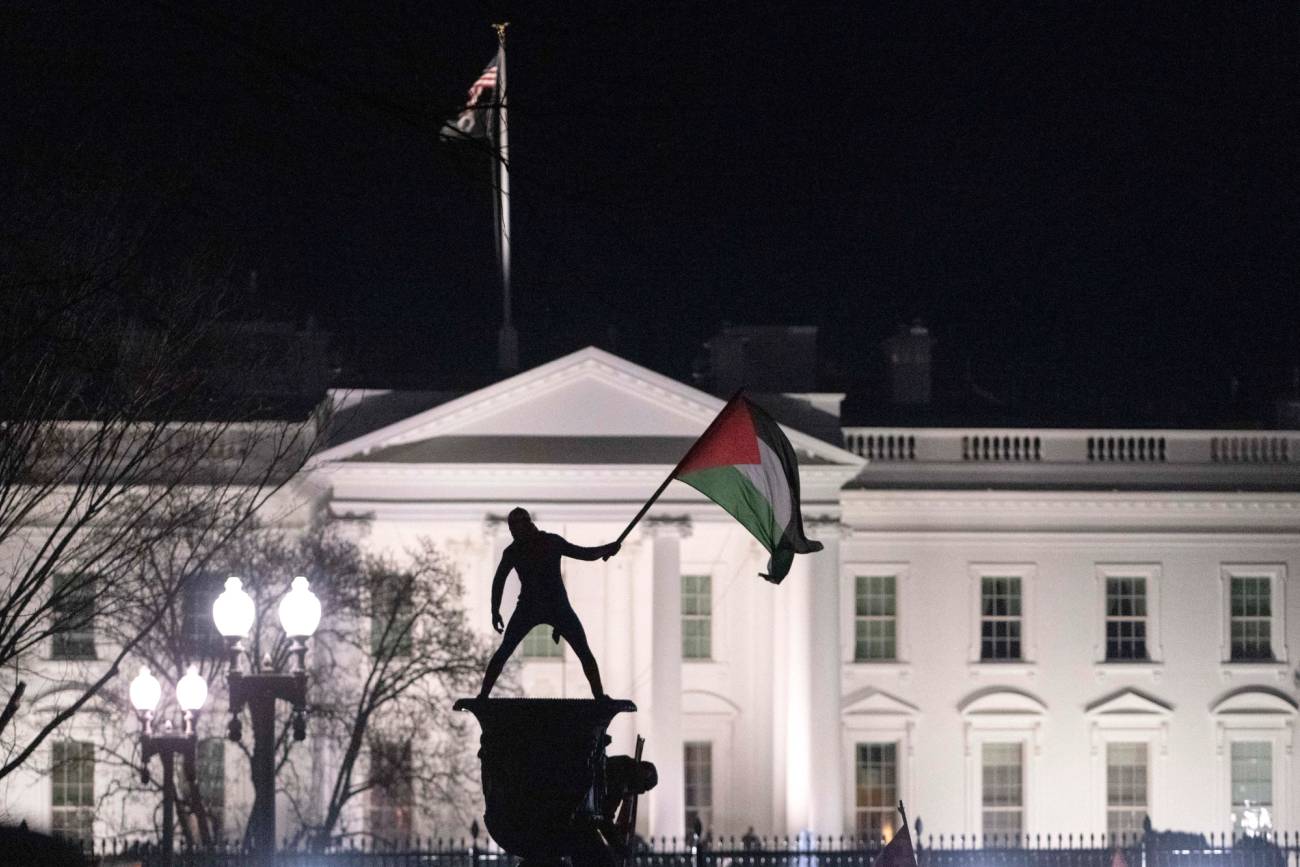Violent Pro-Palestine Demonstrations Are Not a Bug
They’re a feature of a dangerous new politics

OBERTO SCHMIDT/AFP via Getty Images

OBERTO SCHMIDT/AFP via Getty Images

OBERTO SCHMIDT/AFP via Getty Images

OBERTO SCHMIDT/AFP via Getty Images
Anarchic, pro-Palestinian rallies have continued to intensify across the United States ever since Oct. 7, when Hamas massacred 1,200 people and took another 240 hostage. These nationwide protests, marked by highly disruptive tactics, have raised critical questions about the nature of protest, the boundaries of dissent, and the willingness of Western governments to assert and protect basic social values. When one delves deeper into the protesters’ driving ideology, it becomes clear that mass disruption is not a byproduct of their agenda, but the agenda itself.
These groups’ tactics have included blocking roads to international airports on New Year’s Day; endangering passenger planes by launching balloons over the runways; blocking highways that delayed the delivery of organ transplants to hospitals; illegally occupying a House office building near the U.S. Capitol; vandalizing stores supposedly complicit in Israel’s “genocide” of Gaza; disrupting the Macy’s Thanksgiving Day Parade and Christmas tree lighting ceremonies in major cities; and storming the World Trade Center, defacing public monuments, targeting a cancer hospital, and attacking the White House gates while screaming “Allahu akbar” and “intifada revolution.”
What drives these protesters to such extremes, and convinces them to opt for such woefully misguided methods that—by disrupting the lives of ordinary people—appear to be counterproductive to their cause?
At the forefront of these demonstrations are various Islamic organizations often linked to the Muslim Brotherhood, as well as fringe Jewish anti-Zionist groups championing progressive causes such as climate justice and women’s rights. These groups find common ground in an ideology, ostensibly influenced by works of the French Martinican psychiatrist and post-colonial writer Frantz Fanon, that sees “liberation” and “decolonization” as a global revolutionary struggle and perceives their disruptive actions as a vital component of it. They believe that by obstructing crucial social services and public spaces, they effectively challenge superstructures deemed oppressive. This worldview is predicated on the notion that any inconvenience caused to innocent individuals is justified in the pursuit of societal transformation; their obstructive protest methods aren’t a defect, but a requirement of this worldview.
Individuals, after all, matter little in the struggle of global class and sectarian warfare. In the protesters’ eyes, “Palestine” is a stand-in, a representation of every ostensible victim class across the world fighting for their liberation from oppression. Their “solidarity” transcends geographical boundaries, making any random cause and the Palestinian cause inseparable in their eyes.
That’s why, as Seattle-based Palestinian American journalist Tariq Ra’ouf so eloquently put it when his cohorts blocked Seattle’s northbound I-5 last week: “We are going to inconvenience every single person who doesn’t give a fuck [about Gaza] until they give a fuck. That’s how this goes.”
This entire worldview was epitomized in a November 2023 statement released by the Samidoun Prisoner Solidarity Network, a proxy of the Popular Front for the Liberation of Palestine (PFLP) and leading protest organizer, which read:
The power of the US-led imperial core is declining but it continues its desperate stranglehold on capitalism. Gaza is a focal point of this stranglehold and the testing ground for a completely new tactic of extermination … It is increasingly clear that this tactic will not stay contained to Gaza. From Kashmir to Korea, fascist states like India and the US are already laying the groundwork to replicate this tactic. It is clearer every day that we are facing a coordinated effort to normalize not just the genocide of the Palestinians but the genocide of any and all people who resist the US-led imperialist world order.
Similarly, at a pro-Palestinian march in Washington, D.C., in November, organizers highlighted purported similarities between Israel’s treatment of Palestinians and police treatment of Black Americans. They blathered about imperial powers, and stressed the importance of connecting with other global liberation struggles, like the Haitian and Algerian revolutions, to enhance the “collective fight for liberation.” It’s also why, in the wake of U.S. strikes against the Houthi terror group that’s been terrorizing Middle Eastern waterways for months, protesters in New York City chanted “from the river to the sea, Yemen will be free.”
Amid the rising chaos and fervor of these protests, which have been allowed to routinely disrupt life in America’s major cities for over three months now, it’s essential to consider their broader impact on the American social and political fabric. These events are not just isolated demonstrations; nor are they simply responses to the realities of Israel’s conflict with Gaza. They’re also symptomatic of a deeper shift in protest culture in the United States.
According to the Crowd Counting Consortium, between Oct. 7 and Nov. 28 there were 1,869 pro-Palestinian protests in the U.S. involving hundreds of thousands, if not millions, of people collectively. These protests have included civil disobedience, vandalism, and violent assaults, resulting in 1,600 arrests during that time period (the number is undoubtedly hundreds, if not thousands higher by January 2024). Young people are disproportionately represented in these protests, which is unsurprising since American universities have been key vectors for indoctrinating Americans into third-world sectarianism and the valorization of its violence.
Remarkably, many of these demonstrators, and the organizations that pay them and routinely bail them out, are also being supported by wealthy nonprofits such as the People’s Forum, and taxpayers (to the tune of $9 million in NYC). The highly politicized intersections of identity politics, wealthy domestic and foreign funders, and government backing certainly helps explain why these demonstrations have been allowed to continue, month after month, despite open calls for genocide and the destruction of public and private property, and the disruption they inflict on the lives of ordinary citizens.
Despite the volume of pro-Hamas protests—or maybe because of it—84% of Americans continue to support Israel over the terror group. Predictably, there’s also been a mounting backlash to the disruption inflicted by the protesters. “They antagonized people so much that they frightened people, to the point that they were not hearing what they were protesting about,” said Fernando Romero, president of Hispanics in Politics, after protesters interrupted a Jan. 5 event in Las Vegas where Sen. Jacky Rosen, D-Nev., was speaking and had to be escorted out a back door. In a viral video posted online on Jan. 8, a Black New Yorker was seen exiting his van and shoving protesters blocking traffic in New York City, yelling, “You can’t do that! It’s against the law! I have a daughter in Brooklyn … I have to get home!”
The trajectory of anti-Israel protests across America suggests a deeper, more unsettling trend. Far from a legitimate expression of opposition, they’ve morphed into a troubling display of ideological extremism and physical violence cloaked in the guise of social justice and backed by wealthy domestic radicals and by foreign states like Qatar, the primary global sponsor of the Muslim Brotherhood. The reckless tolerance of this continuing level of radicalism and disruption does a profound disservice to the principles of democracy and civil discourse. Whatever one believes the rights and wrongs of the Israeli-Arab conflict to be, allowing violent demonstrators calling for genocide and supporting terror organizations like Hamas and the Houthis to own the streets of Western democracies sends a very dangerous message—one that threatens the fabric of a society built on liberal values and legitimate dissent.
Eitan Fischberger is an international relations and Middle East analyst. Find him @EFischberger.